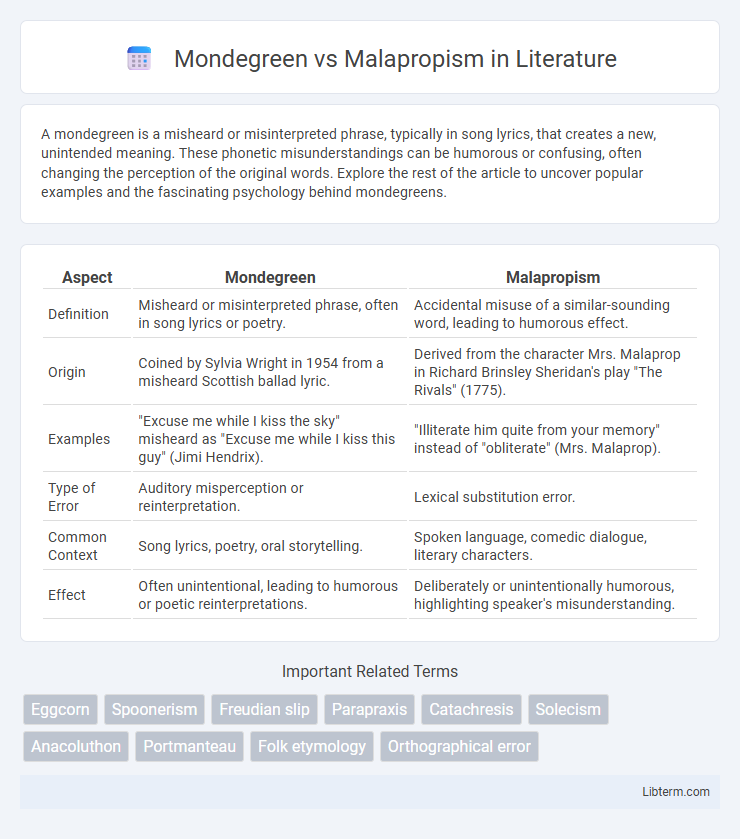A mondegreen is a misheard or misinterpreted phrase, typically in song lyrics, that creates a new, unintended meaning. These phonetic misunderstandings can be humorous or confusing, often changing the perception of the original words. Explore the rest of the article to uncover popular examples and the fascinating psychology behind mondegreens.
Table of Comparison
| Aspect | Mondegreen | Malapropism |
|---|---|---|
| Definition | Misheard or misinterpreted phrase, often in song lyrics or poetry. | Accidental misuse of a similar-sounding word, leading to humorous effect. |
| Origin | Coined by Sylvia Wright in 1954 from a misheard Scottish ballad lyric. | Derived from the character Mrs. Malaprop in Richard Brinsley Sheridan's play "The Rivals" (1775). |
| Examples | "Excuse me while I kiss the sky" misheard as "Excuse me while I kiss this guy" (Jimi Hendrix). | "Illiterate him quite from your memory" instead of "obliterate" (Mrs. Malaprop). |
| Type of Error | Auditory misperception or reinterpretation. | Lexical substitution error. |
| Common Context | Song lyrics, poetry, oral storytelling. | Spoken language, comedic dialogue, literary characters. |
| Effect | Often unintentional, leading to humorous or poetic reinterpretations. | Deliberately or unintentionally humorous, highlighting speaker's misunderstanding. |
Understanding Mondegreen and Malapropism
Mondegreens arise from misheard or misinterpreted phrases, often in song lyrics, creating new meanings that differ from the original intent. Malapropisms occur when a speaker mistakenly uses a word that sounds similar to the intended one but has a completely different meaning, leading to humorous or confusing results. Understanding these linguistic phenomena reveals how auditory perception and vocabulary errors influence everyday communication and language interpretation.
Definition of Mondegreen
A mondegreen is a misheard or misinterpreted phrase, often in song lyrics, where the listener substitutes incorrect words that sound similar to the original. This phenomenon differs from a malapropism, which involves the mistaken use of an incorrect word that sounds similar to the intended one but changes the meaning in a humorous or nonsensical way. Mondegreens typically arise from auditory ambiguity, leading to popular misinterpretations that can become culturally significant over time.
Definition of Malapropism
Malapropism is a linguistic error where a person mistakenly replaces a word with another that sounds similar but has a completely different meaning, often leading to humorous or nonsensical expressions. This phenomenon contrasts with mondegreens, which arise from mishearing or misinterpreting phrases, especially in songs or poetry. While malapropisms stem from incorrect word choice within a sentence, mondegreens depend on auditory misinterpretation.
Key Differences Between Mondegreen and Malapropism
Mondegreens occur when a phrase or lyric is misheard and misunderstood, often altering the meaning based on phonetic similarity, such as hearing "sweet dreams are made of cheese" instead of "sweet dreams are made of these." Malapropisms involve the mistaken use of a word that sounds similar to the intended word but has a completely different meaning, like saying "dance a flamingo" instead of "dance a flamenco." The key difference lies in mondegreens being primarily auditory misinterpretations of phrases, while malapropisms are incorrect word substitutions that disrupt the intended sense or grammar.
Famous Examples of Mondegreens
Famous examples of mondegreens include Jimi Hendrix's "'Scuse me while I kiss the sky," often misheard as "'Scuse me while I kiss this guy," and Elton John's "Tiny Dancer," where "hold me closer, tiny dancer" is frequently heard as "hold me closer, Tony Danza." These misheard lyrics reveal how auditory illusions in song lyrics create humorous or nonsensical interpretations, distinct from malapropisms, which involve incorrect word usage for comedic or mistaken effect. Understanding mondegreens enriches the appreciation of linguistic phenomena in popular culture and highlights the human tendency to reshape sounds into familiar phrases.
Notable Examples of Malapropisms
Notable examples of malapropisms include Mrs. Malaprop from Richard Sheridan's play "The Rivals," who famously confuses words like "allegory" for "alligator." Another well-known case is Yogi Berra, whose humorous statements often contained malapropisms such as "Texas has a lot of electrical votes" instead of "electoral votes." These instances highlight how malapropisms create confusion by substituting similar-sounding but incorrect words, distinguishing them from mondegreens, which involve misheard lyrics or phrases.
Causes and Origins of Mondegreens
Mondegreens originate primarily from misheard phrases in songs, poems, or speeches, often due to unclear pronunciation, unfamiliar accents, or ambiguous phrasing, leading listeners to reinterpret sounds as familiar words or phrases. These errors in auditory perception contrast with malapropisms, which arise from a speaker's misuse of words based on incorrect vocabulary knowledge or phonetic similarity, rather than mishearing. The phenomenon of mondegreens underscores the brain's effort to find meaning in ambiguous auditory input, reflecting cognitive processes involved in language comprehension and memory.
The Impact of Malapropisms in Language
Malapropisms, the mistaken use of a word in place of a similar-sounding one, significantly impact language by introducing humor and confusion in communication. These errors often reveal gaps in vocabulary knowledge while highlighting the importance of context for meaning. Their frequent occurrence in literature and dialogue showcases the playful and evolving nature of language use.
How Mondegreens and Malapropisms Affect Communication
Mondegreens distort communication by altering the perceived meaning of phrases through misheard lyrics or statements, often leading to humorous or confusing interpretations. Malapropisms disrupt clarity by substituting words with similar sounds but incorrect meanings, causing misunderstandings and sometimes unintended comedy. Both phenomena highlight the importance of accurate auditory processing and vocabulary knowledge in effective verbal communication.
Embracing Linguistic Errors: Humor and Insight
Mondegreens and malapropisms showcase how linguistic errors can spark humor and offer insight into language use. Mondegreens arise from misheard phrases, often in song lyrics, creating amusing reinterpretations that highlight auditory perception challenges. Malapropisms involve the mistaken substitution of words with similar sounds but different meanings, revealing nuances in vocabulary comprehension and social context.
Mondegreen Infographic

 libterm.com
libterm.com